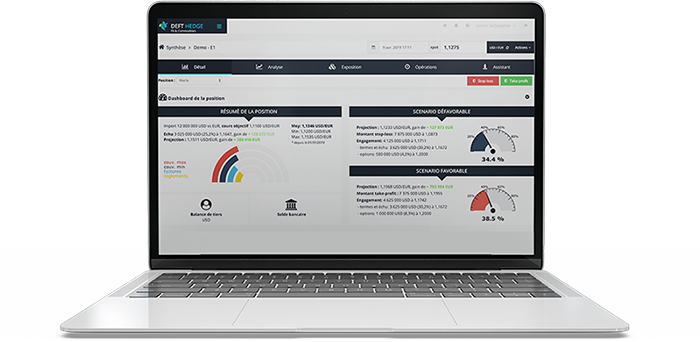Valuation of hedging derivatives.

When you engage in transactions on the financial markets, you are exposed to certain risks, in particular in connection with currency fluctuations.
To protect yourself against these risks, there are various hedging instruments available today. Among them are, in particular, derivatives.
Of various types, they can be used by companies to avoid major financial losses. In order to understand how derivatives work and how they are valued, we will go back over these different points in detail.
To ensure that your activity on the financial markets is as beneficial as possible, it is essential to adopt the best possible strategy and use the right hedging instruments.
In order to help you in this respect, DeftHedge has developed a SaaS software solution to support all professionals in their behaviour on the financial markets.
With our tool, you will be able to adopt and perfect your hedging strategy and make the most of derivatives. To take advantage of all the benefits of DeftHedge for your daily business, discover here all the functionalities of our financial risk management tool.
What are derivatives ?
What are derivatives ?
Before looking at the valuation of derivatives, it is necessary to look again at the nature and usefulness of derivatives. These financial instruments have been set up so that companies can hedge against several risks linked to financial markets: liquidity, market trends, counterparty, political risks, etc. Several criteria can characterise derivatives, also known as derivative contracts:
Their value fluctuates according to changes in the rate or price of an underlying asset.
They require little or no initial investment
Their payment is made at a future date fixed at the signature of the contract.
This type of instrument has developed very strongly since the end of the 20th century and the total value of outstanding derivatives is now very large, representing more than 10 times the world’s GDP.
What is the interest for professionals ?
When you are present on the financial markets, you are exposed to certain risks that can now be controlled thanks to various hedging instruments.
Derivatives are among these hedging instruments that are particularly useful for companies.
Indeed, they allow professionals to protect themselves against an unfavourable change in the price of the underlying assets. With derivatives, the price of assets acquired or sold at a future date is fixed in advance, thus avoiding the impact of an unfavourable change in price during the period between signature and payment.
For professionals, derivatives represent a kind of insurance policy protecting against fluctuations in exchange rates, interest rates or product prices.
What are the different types of derivatives ?
Derivatives are mainly traded on over-the-counter markets (about 80% of trading) as well as on organised markets. Today, these derivatives can be of different types, among which we mainly find :
Options
Warrants
Futures (forward contracts)
What is the valuation of hedging derivatives ?
Comparable to an insurance policy, a derivative therefore has a specific value which depends on several criteria in order to be able to evaluate it.
Indeed, the price of a derivative will depend on the risks insured. This implies that the greater the risks to be covered, the higher the option will be.
In order to value a hedging derivative, several elements must therefore be taken into account in the calculation:
The underlying: nature, price, volatility of the value
Term to maturity of the contract
Interest rates
In order to ensure that the price of the financial hedging derivative is as fair as possible, an accurate valuation must therefore be carried out taking into account all these elements.
Today, two valuation methods can be distinguished on the market: the Cox & Rubinstein method and the method based on the Black & Scholes formula.


What is IFRS ?
Since 2005, companies listed on a European market have had to comply with the rules of an accounting framework: the International Financial Reporting Standards (IFRS).
This framework consists of a set of standards defining a precise framework for accounting methods.
Bringing listed companies into compliance with this accounting framework improves comparability between the financial statements of companies in the same sector.
This is particularly beneficial for simplifying and optimising investment choices later on.
What is French GAAP ?
While IFRS applies to all companies listed on European markets, each country has its own set of accounting standards, which are more or less different from the IFRS standards.
In France, “French GAAP” (Generally Accepted Accounting Principles), also known as PCG (Plan Comptable Général), is applied.
Issued by the Autorité des Normes Comptables (ANC), this text defines the various accounting rules that companies domiciled in France must comply with: financial accounts, balance sheets, income statements, reports, etc.
Like IFRS, the PCG is intended to facilitate the control and comparison of accounting between companies.
In order to be best adapted to globalisation, French companies are aligned with these rules as well as with international standards.
How will the DeftHedge solution help you with the valuation of derivatives ?
DeftHedge is keen to help professionals improve their strategy on the financial markets and protect them against the various risks on these markets, and offers a solution that is perfectly adapted to their needs.
Indeed, our particularly comprehensive SaaS solution allows you to considerably improve your financial risk management by having at your disposal a maximum of information on price trends and the various opportunities to buy and sell on the international markets.
By opting for our financial forecasting software, you will have access to a number of high-quality functionalities:
Currency management and monitoring
Automation of multiple daily management tasks
Development and improvement of coverage strategies
Data centralisation and security
Optimisation of sales and purchases on the markets
As regards hedging derivatives, DeftHedge is a particularly useful tool for valuing them.
Indeed, our software has been designed to help professionals to manage their financial situation in the best possible way and in particular to face all financial risks.
Thanks to DeftHedge, you will be able to make the best use of all the different financial instruments in order to be efficient and perfectly protected on the world markets.
In order to discover all the functionalities of our SaaS solution and to customize this tool to your needs, do not hesitate to contact our team of experts who will help you to get started with this software.
With DeftHedge, you will be able to considerably improve your financial management and reduce as much as possible all the risks you face when trading on the markets.
Soon, our tool will become a must for your daily management. By automating various time-consuming tasks, you will be sure to have a financial situation in order, and this in all simplicity.
To get the most out of your hedging derivatives, take advantage of DeftHedge’s numerous functionalities.
